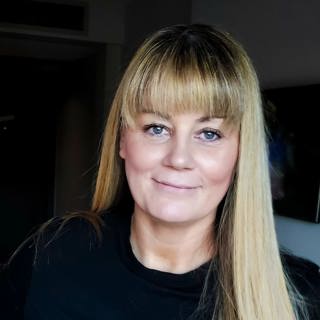Angela's story

Angela was diagnosed with bipolar disorder when she was 19 years old, and also struggles with anxiety. As a See Me volunteer, she has shared her experiences of mental health stigma and discrimination in the media and speaking at events, including a recent one at the Scottish Parliament.
Angela says that despite many positive experiences where she’s been open about her mental health, there are still situations where she holds back, driven by public stigma and a fear of other people’s reactions.
If I had a tummy bug, I would have no problem saying, ‘Sorry, I can’t come in today, I’ve got a tummy bug.’ But if it’s my mental health, depending on the situation, I might say, ‘Sorry, I’ve got a migraine.’
It’s not as if my mental health isn’t out there – if people are interested, there’s a lot of stuff on websites where I’ve spoken about it – but I still hold back sometimes.
Even with all the raising awareness that I do and believe in, I still find it difficult myself to admit that I’m struggling sometimes. It’s not because I’m ashamed of it – but I am scared of other people’s reactions. Will they think of me differently? Will they treat me differently? Will they think I’m not fit to do this role?
I know that with mental illness, you can’t help it, you can do your best to manage it as best you can. So I shouldn’t feel like I can’t be honest with other people – but there are still times where I’m unsure of what their reaction will be, because of the stigma that’s still out there.
The way people speak about mental health still is frustrating. Something I’ve been witness to is people who know I’m somebody who lives with a mental illness speaking about other people very derogatively – their ‘mad’ neighbour up the road, for instance. ‘Don’t got into their house, you might not come out alive,’ – things like that. I had a neighbour who wasn’t known by his name any more – he was ‘the schizo’, which was awful.
Holding back
When I hear people speaking like that, I’ve had to hold back, because I think, if you have that opinion, what’s to stop you talking like that about me? It makes me quite guarded.
Not being honest about myself, about who I am, is something that eats me up – it goes completely against my nature to not be honest. We should all be able to speak openly and honestly about our mental health.
It would make a huge difference if we could get to a stage where there’s no difference between your mental health and your physical health. You’re not ashamed when you break your leg – and you shouldn’t be ashamed if your head isn’t working very well for a while.
For all that we have come a long way in speaking about mental health and tackling stigma, we still have a long way to go. When you hear these conversations, there’s still so much stigma, and it’s a huge barrier for lots of people like me.”
